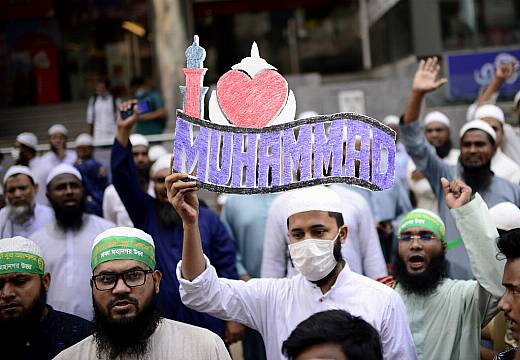Around 10,000 people have rallied in the capital of Bangladesh to protest against the French president and his staunch support of laws that deem caricatures depicting the Prophet Muhammad as protected under freedom of speech.
Protesters from the conservative Islami Andolon Bangladesh group, which supports the introduction of a blasphemy law in the Muslim-majority country, carried banners and placards in Dhaka reading: “All Muslims of the world, unite”, and: “Boycott France”.
It is the largest protest against the cartoons in recent days.

Some carried portraits of French president Emmanuel Macron with an “X” on his face. One protester carried a cut-out image of the French president with shoes around his neck, as an insult.
The issue has once again come to light in recent days following the beheading of a French teacher near Paris after he had shown caricatures of the Prophet Muhammad in class.
The 18-year-old Chechen refugee who carried out the attack was later shot dead by police.
The teacher, Samuel Paty, has been heralded as a symbol of France’s staunch secular ideals and its rejection of religious intrusion in public spheres.
Mr Macron and members of his government have vowed to continue supporting such caricatures as protected under freedom of expression.

Muslim politicians, religious scholars and everyday people have condemned such depictions as a form of hate speech and view them as sacrilegious and insulting to Islam.
Muslims have been calling for both protests and a boycott of French goods in response to France’s stance on caricatures of Islam’s most revered prophet.
Five years ago, French-born al-Qaida extremists killed 12 employees of the French satirical weekly Charlie Hebdo in response to its publication of caricatures depicting the Prophet Muhammad.
Those cartoons also sparked mass protests in Muslim-majority countries, with some turning deadly.
Iran has summoned a French diplomat to protest against France’s stance on the caricatures.
A report by state TV said an Iranian foreign ministry official told the French diplomat that Paris’ response in the aftermath of Mr Paty’s killing was “unwise”, and that France was permitting hatred against Islam under the guise of support for freedom of expression.

A powerful association of clerics in the Iranian city of Qom also urged the government to condemn Mr Macron.
Iranian hard-line newspaper Vatan-e Emrooz depicted Mr Macron as the devil and called him Satan in a cartoon on its front page on Tuesday.
Pakistan’s parliament passed a resolution condemning the publication of cartoons of the prophet.
In Saudi Arabia, the state-run Saudi Press Agency put out a statement from the foreign ministry saying the kingdom “rejects any attempt to link Islam and terrorism, and denounces the offensive cartoons of the prophet”.
Saudi clerics have also condemned the caricatures, but have also cited the prophet’s “mercy, justice, tolerance”. Another prominent sheikh called on Muslims not to over-react.

The Arab Gulf state of Qatar also condemned what it described as “the dramatic escalation of populist rhetoric” inciting religious abuse.
The government said inflammatory speech is fuelling calls for the repeated targeting of nearly two billion Muslims around the world through the deliberate offending of the Prophet Muhammad, and has led to an increase in hostility toward Muslims.
Bangladeshi protesters gathered in front of the main Baitul Mokarram Mosque in Dhaka on Tuesday morning.
The group walked toward the French Embassy, but police intercepted the march, which ended without violence.
Protests have also been held recently in Iraq, Turkey and the Gaza Strip.







